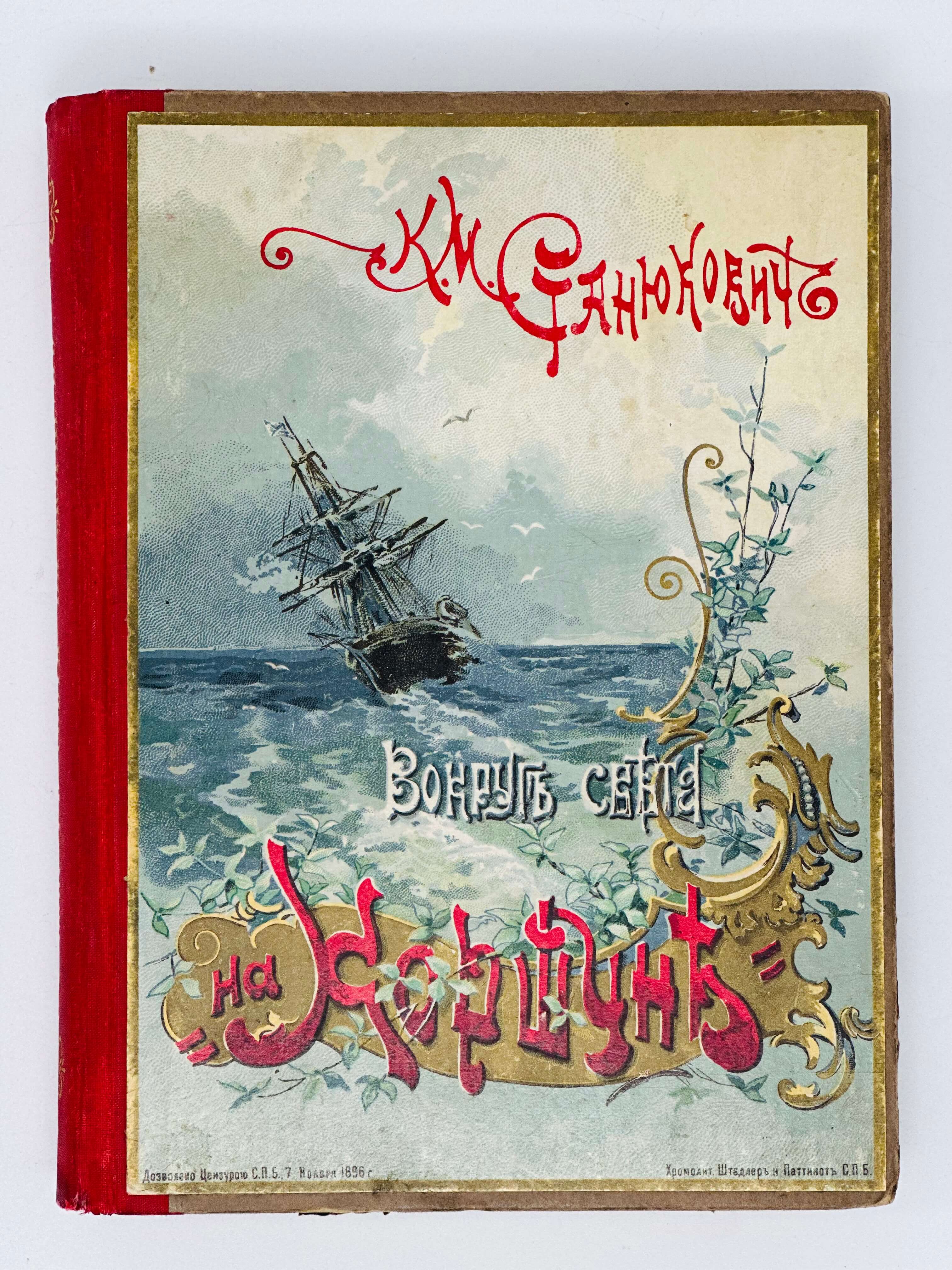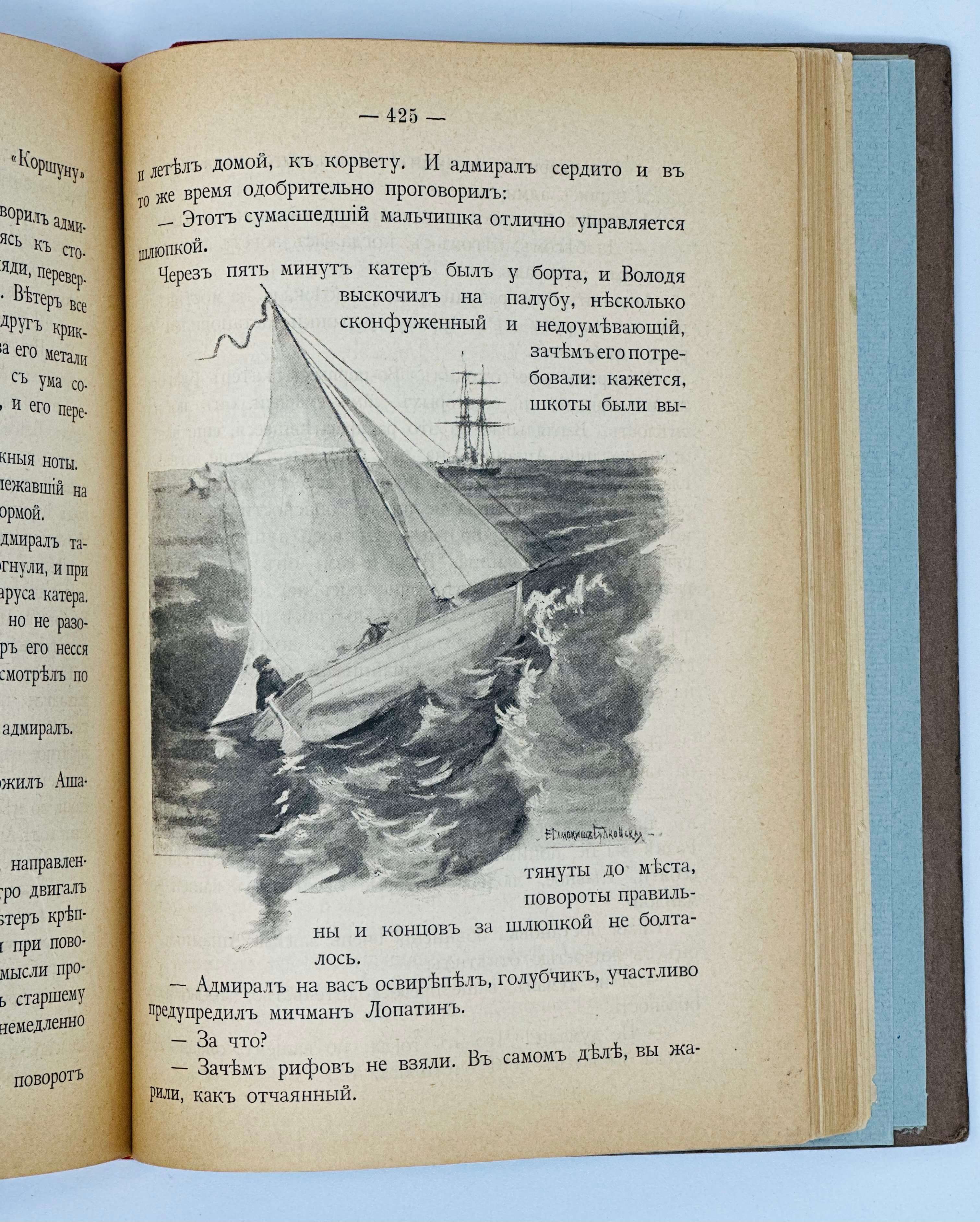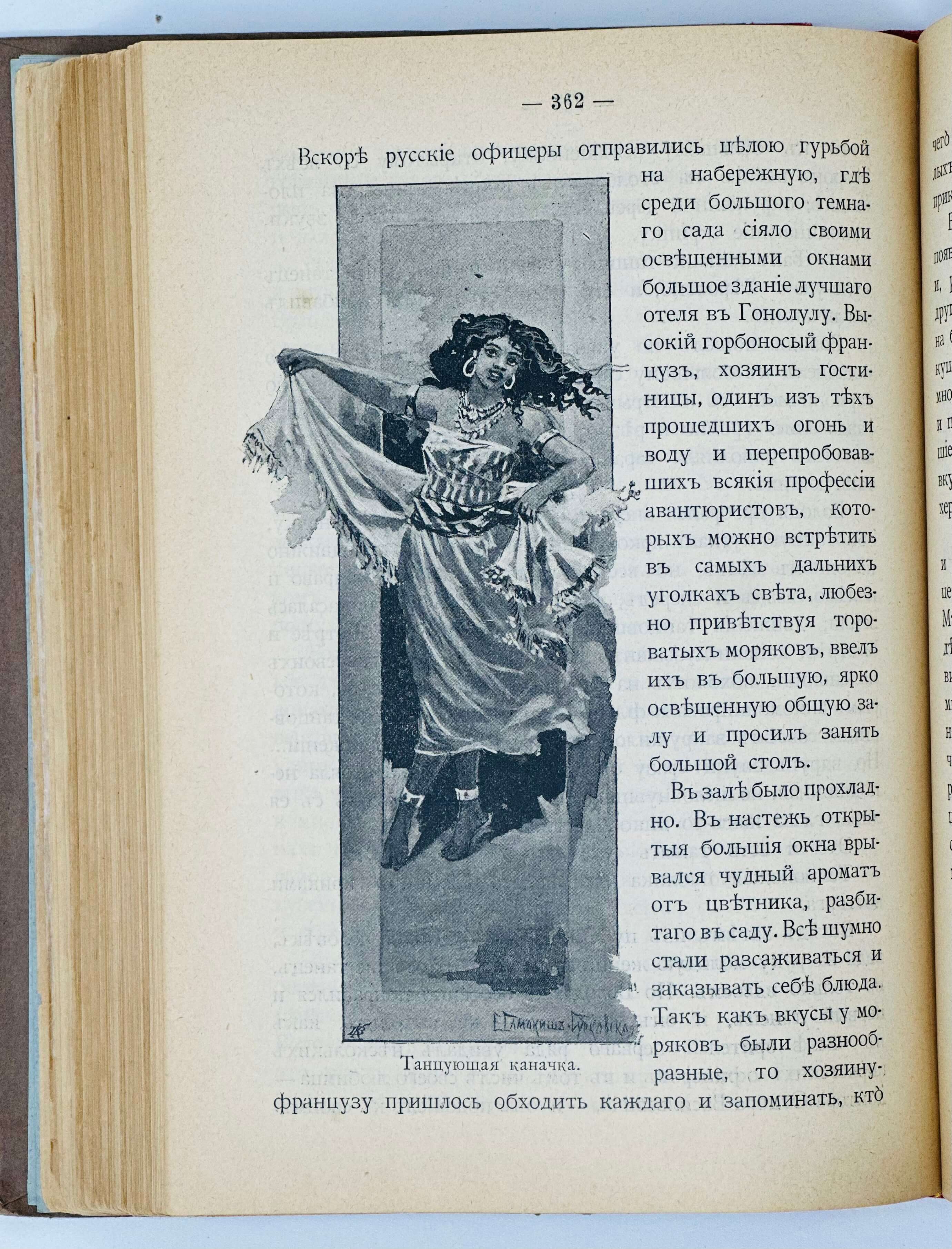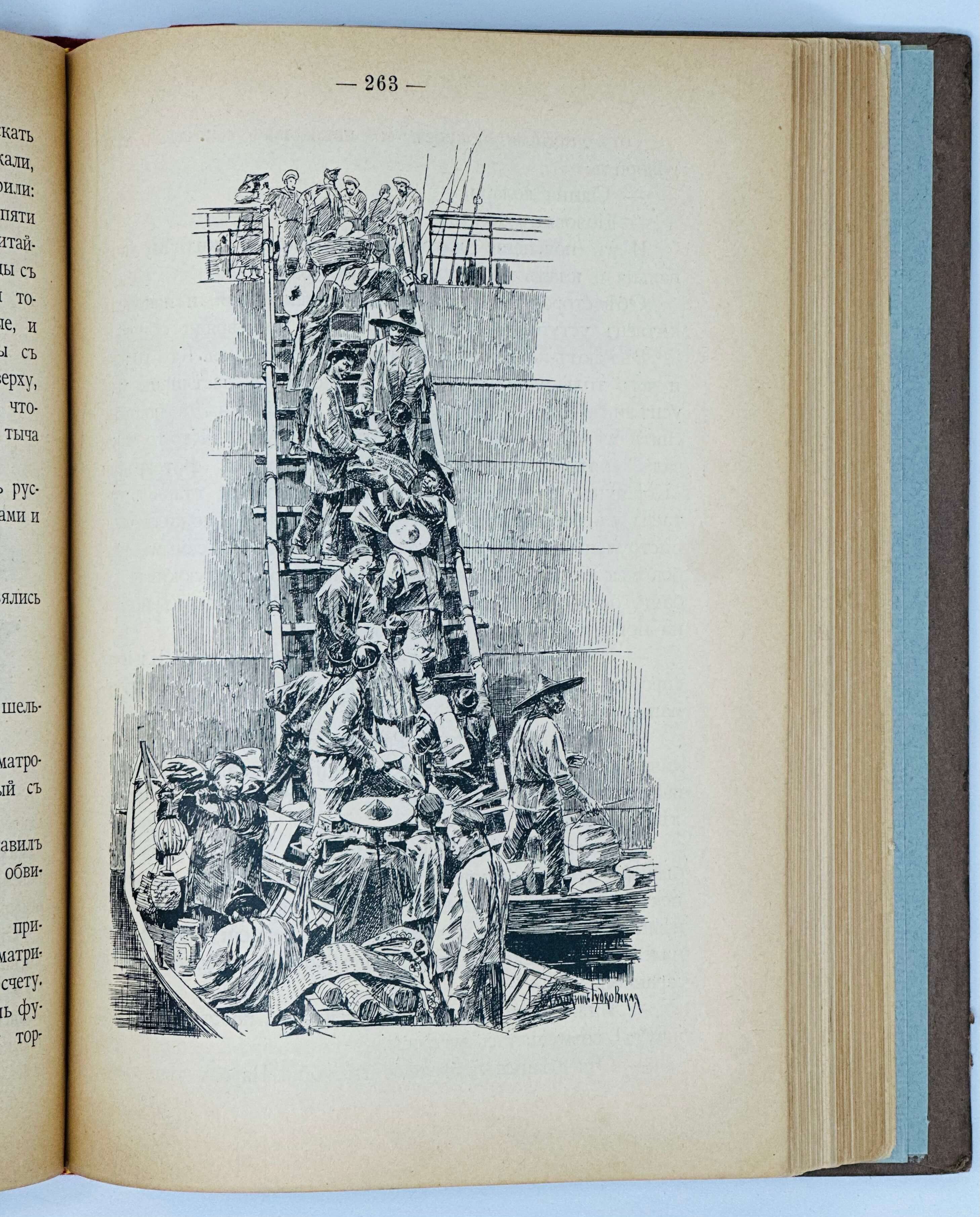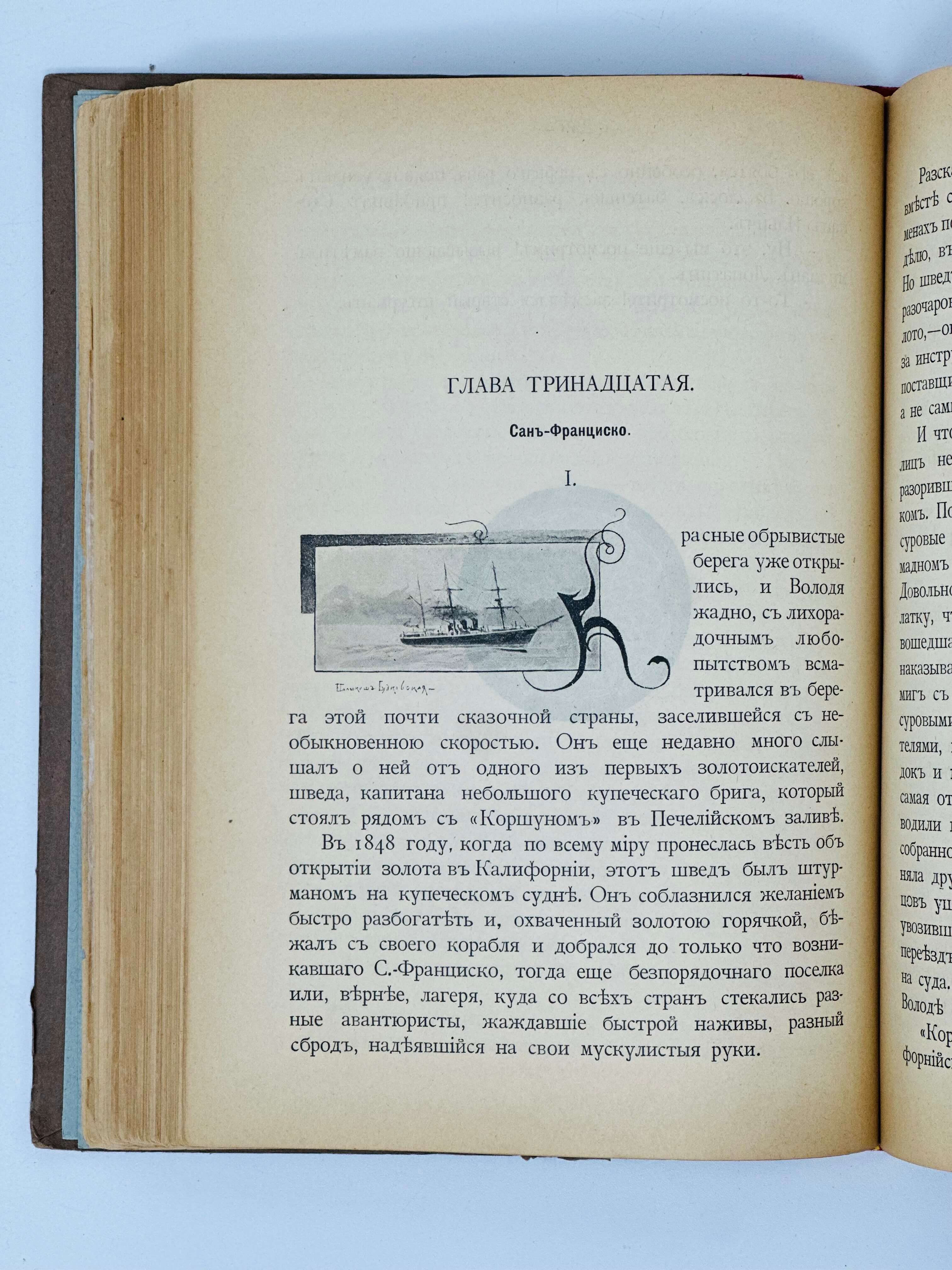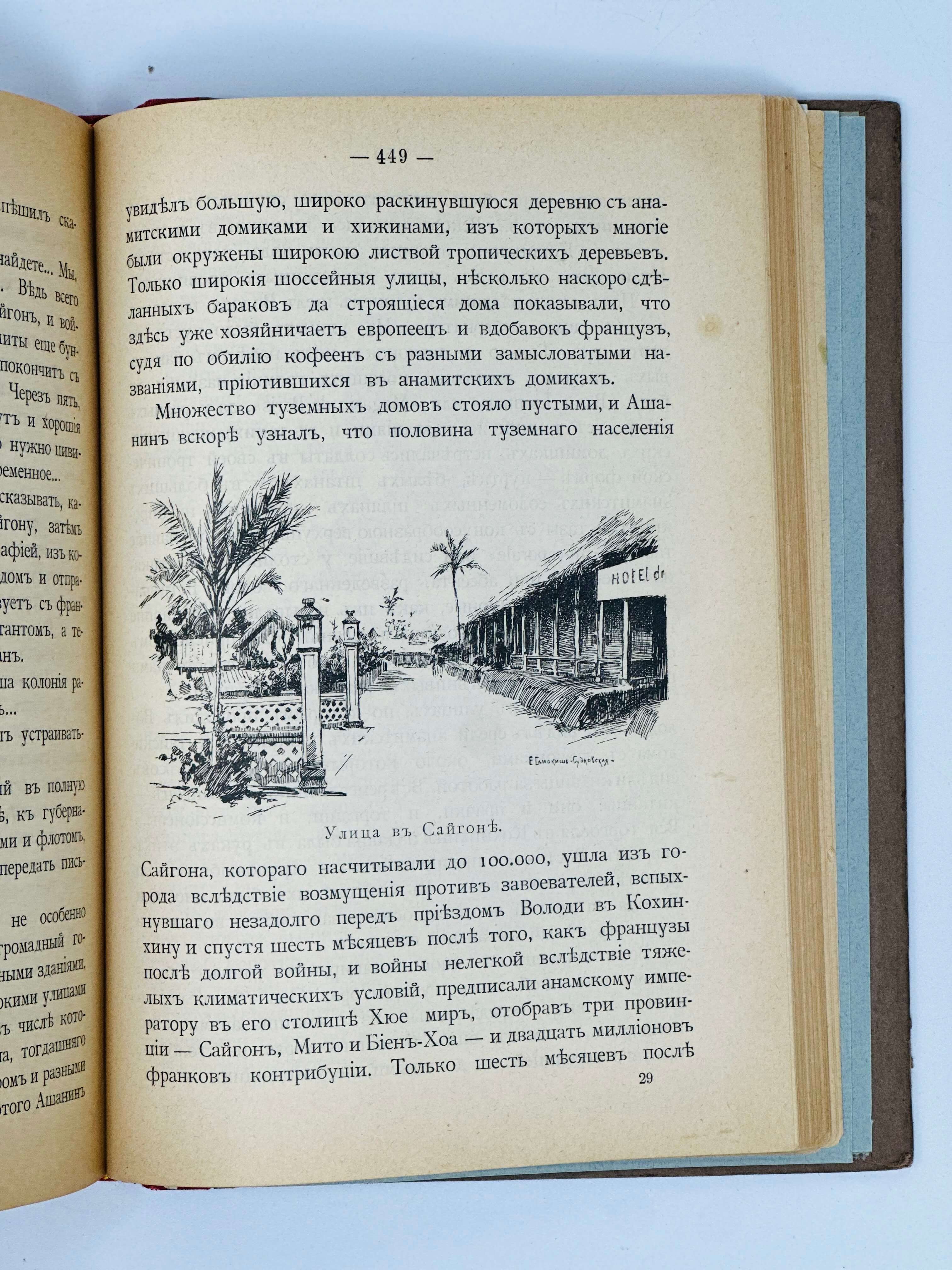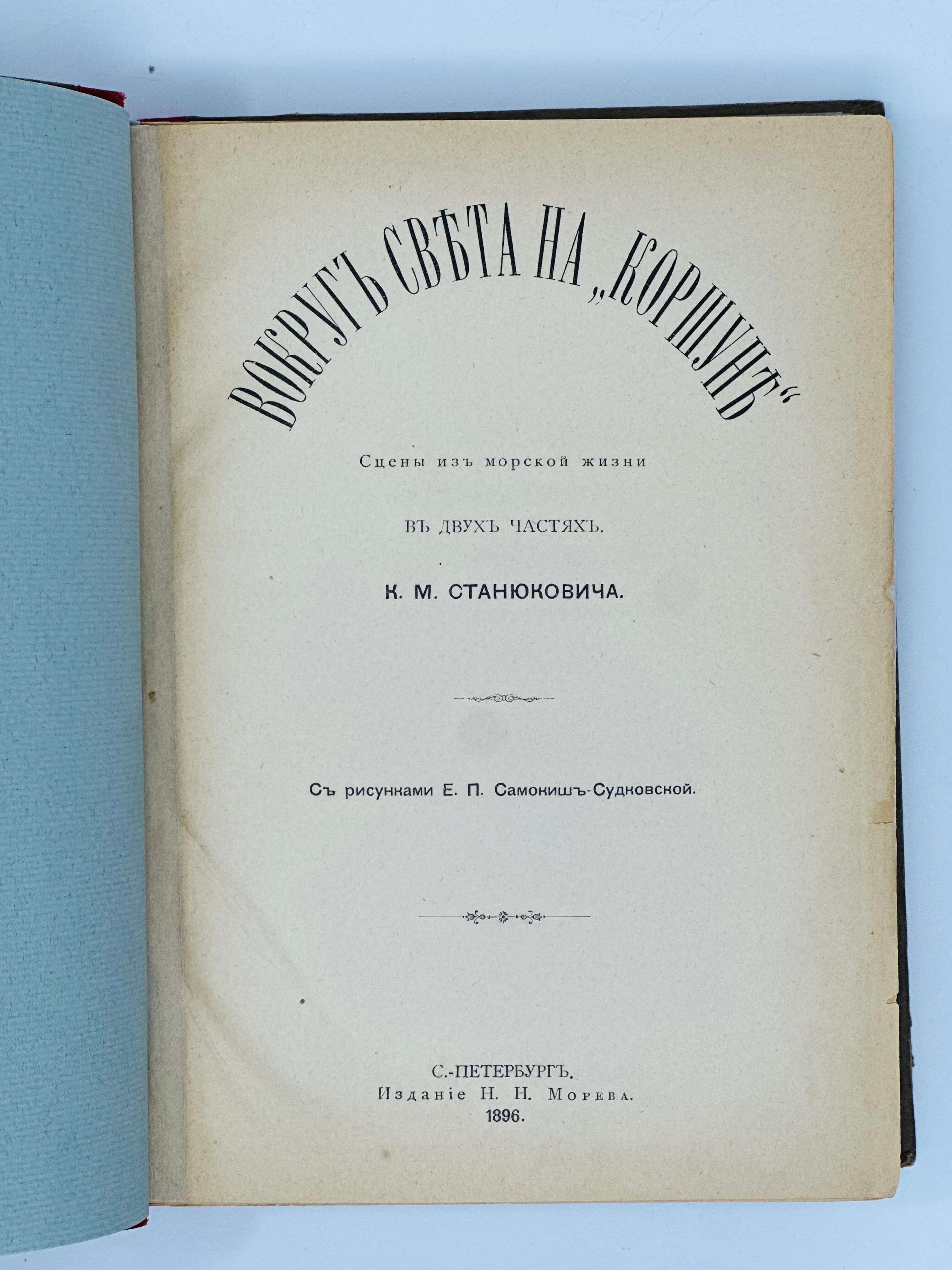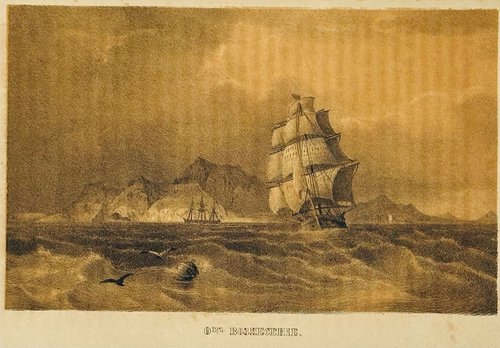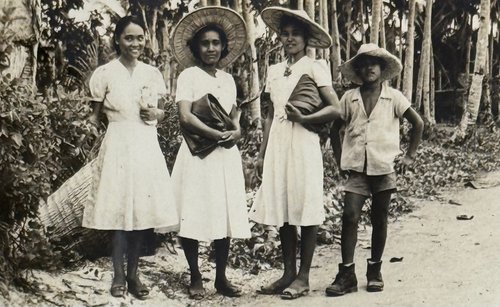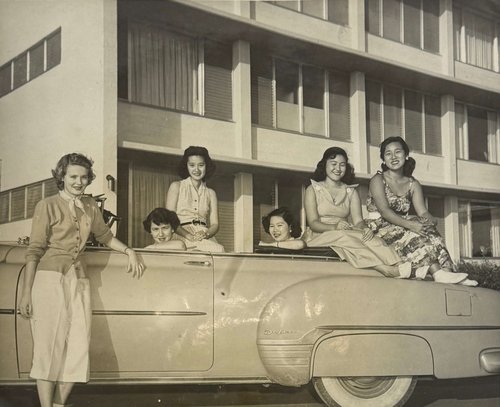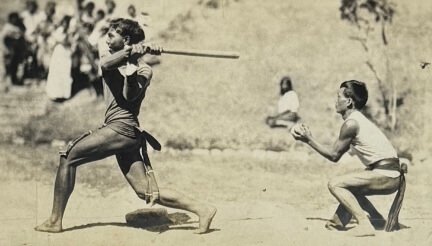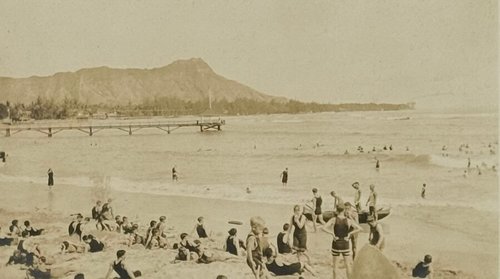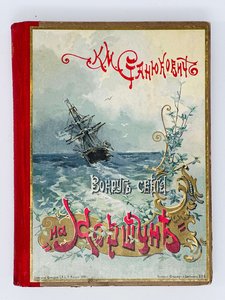
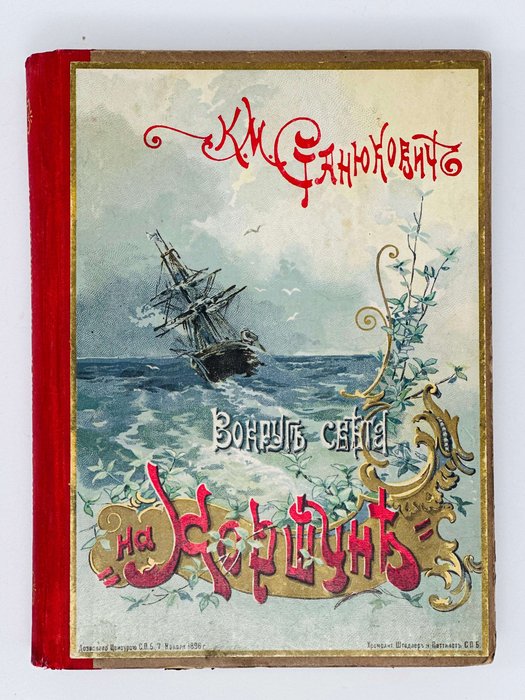
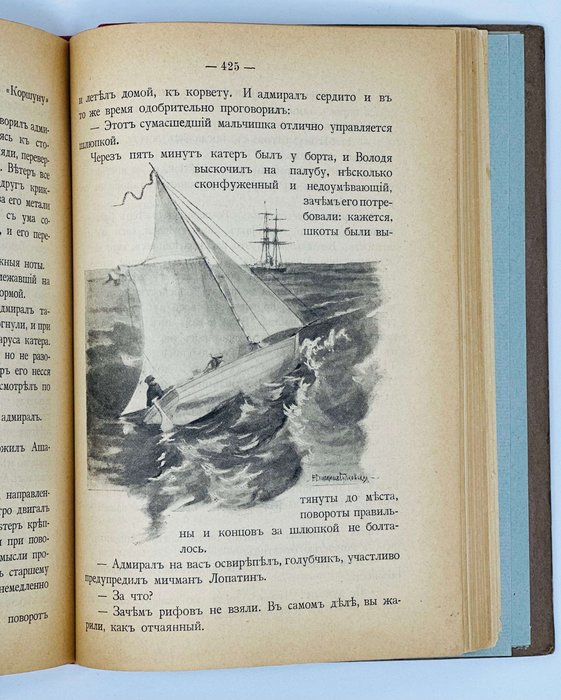
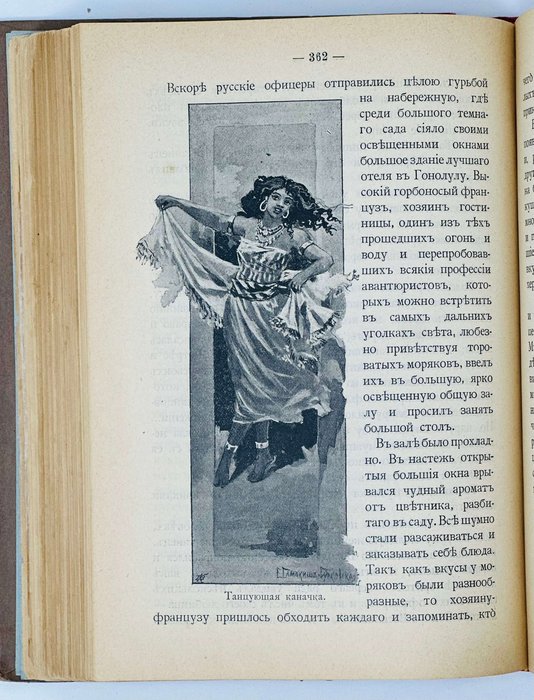
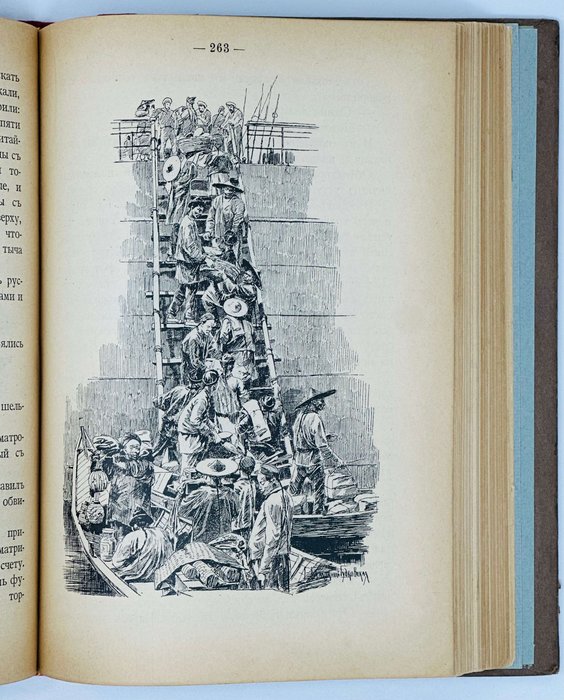
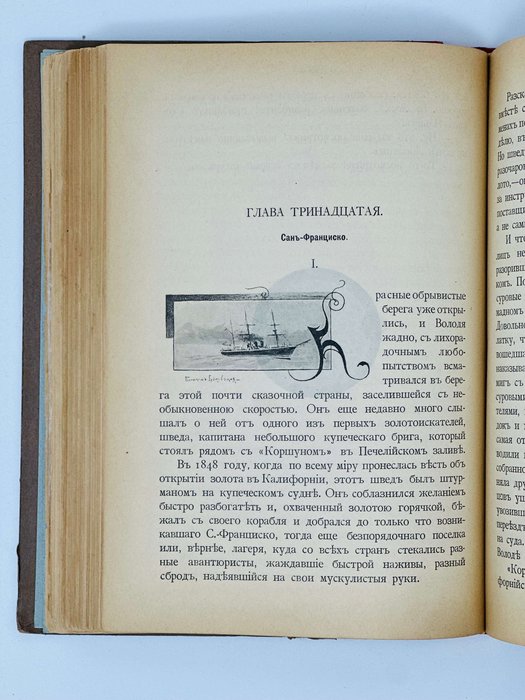
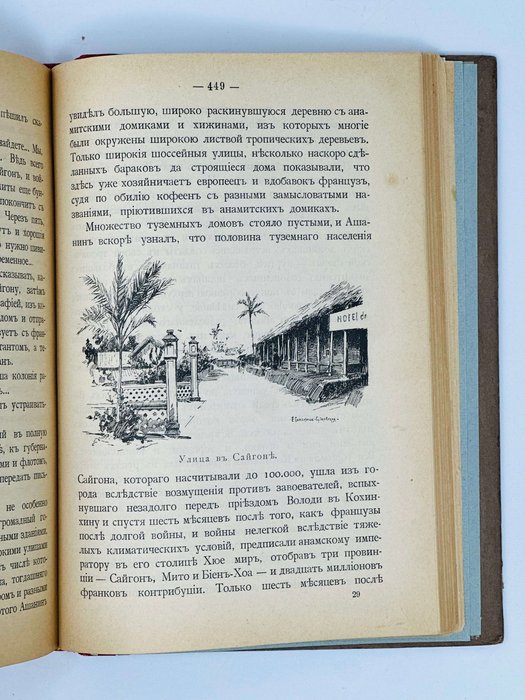
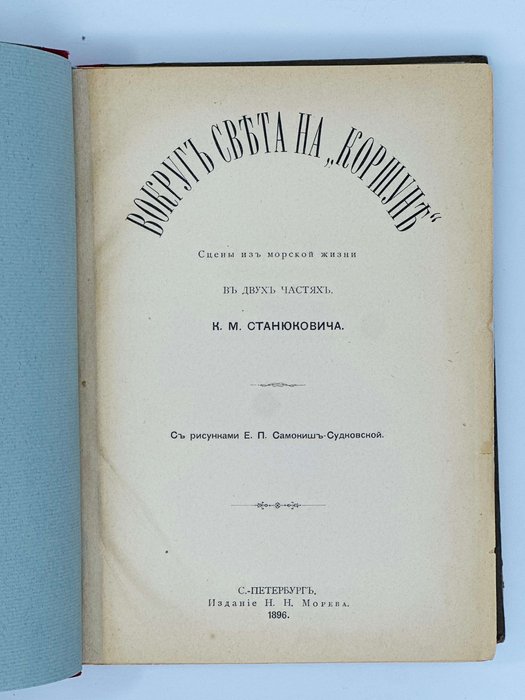
#RA47
1896
First edition. Octavo (ca. 23x16,5 cm). [2 – t.p], [2 - dedication], [2 – half title], 544 pp. With numerous printed illustrations and vignettes after the drawings by Elena Samokish-Sudkovskaya in text. Original publisher’s hardcover binding with a chromolithographed illustrated front cover; cloth spine with a gilt-lettered title. New endpapers. Paper slightly age-toned, but overall a very good copy.
Very Rare Russian imprint with no paper copies found in Worldcat. First edition of a Russian young adult novel about a circumnavigation of a Russian naval ship, with a lengthy account of its call in Honolulu and officers’ audiences with King Kamehameha IV (1834-1863) and Queen Emma of Hawaii (1836-1885), as well as interesting notes on San Francisco, Hong Kong, Batavia (Jakarta), Saigon (Ho Chi Minh City), the final stage of the French Cochinchina Campaign (1858-1862), &c. The author was a prominent Russian writer Konstantin Staniukovich, well-known for his “maritime” stories from the life of the Russian Imperial Navy. To our knowledge, the novel was never translated into English.
The novel is based on Staniukovich’s personal experience as a midshipman during his three-year service (1860-63) on several Russian naval ships in Southeast Asia, the Russian Far East and the North Pacific (corvette “Kalevala,” transport ship “Yaponets,” clipper “Gaidamak,” and others). The main hero, midshipman Volodya Ashanin, is appointed to the Russian naval corvette “Korshun” and describes his adventures during the voyage from Kronstadt to London, Brest, Madeira, Cape Verde Islands, Batavia, Hong Kong and Canton, Bohai Sea, San Francisco, Honolulu, Hakodate, Saigon, Amoy, and back to Russia. In 1861-1864, Staniukovich published several short stories describing the separate legs of the corvette “Kalevala’s” voyage, in the “Morskoy Sbornik” and other Saint Petersburg magazines. In 1867, his first book, also based on “Kalevala’s” voyage, was issued in Saint Petersburg (Staniukovich, K. Iz krugosvetnogo plavaniya: Ocherki morskogo byta. SPb.: Typ. of V. Golovin, 1867). None of these publications described the corvette’s stay in Hawaii. To our knowledge, the chapter in the “Vokrug Svieta na Korshune” is the first publication of Staniukovich’s account of his visit to Honolulu.
The lengthy chapter, titled “Honolulu” (part 2, pp. pp. 345-401), describes the corvette’s stay in the city in September 1862, a week after “the Royal couple lost their heir and only son, a little boy, who died unexpectedly of a sunstroke” (p. 387). Evidently, the author means the death of Prince Albert Kamehameha (1858 – August 27, 1862). The text includes descriptions of Honolulu harbour and waterfront, native market and fruit sellers, residential quarters, hula dance, “the best hotel” where Russian officers had their dinner, an excursion in a horse-driven carriage to the Pali lookout, their guide and former American whaling captain “A. Cutter,” &c. A separate part of the chapter talks about the audience given to the Russian officers by King Kamehameha IV and Queen Emma of Hawaii in the royal palace (the appearance of the monarchs, the interior of the palace, &c.); and the couple’s visit to the Russian corvette (dinner with the officers, the main hero’s talk to the queen, who presented him with a rose, which made other midshipmen to tease him later). Several pages of the next chapter contain cordial conversations with the Russian sailors, who were amazed by Honolulu and its people and regretted leaving. The chapter is illustrated with nine drawings of a noted Russian female artist, Elena Samokish-Sudkovkaya (1862-1924): a vignette with a Hawaiian sunset; Volodua Ashanin dressing for the visit to Honolulu; Kanakas’ fruit stalls; A Kanaka girl dancing [hula]; Ashanin on a horse-carriage tour of Honolulu; a vignette with tropical flora; Russian cutter boats on the way to Honolulu; Queen Emma of Hawaii; Ashanin riding a horse on a Hawaiian night.
The chapter on San Francisco contains notes on the American Civil War, San Francisco’s busy harbour and waterfront, the warm reception of the Russian ship, numerous dinners, picnics and parties; the main hero falling in love with an American girl and thinking about a proposal; a meeting with a runaway Russian sailor Ivan Ryabkov – now “John Ryab;” farewell ball on the corvette, &c. Overall an important rare Russian account of Honolulu in the spring of 1862.
The table of contents:
Part 1. Chapter 1. Unexpected assignment. Chapter 2. Farewell, Russia! Chapter 3. First impressions. Chapter 4. First thrashing [North Sea]. Chapter 5. Rescue of the drowning [people]; Chapter 6. Farewell, Europe! [London, Brest]. Chapter 7. Madeira and Cape Verde Islands. Chapter 8. In the tropics [Crossing the Equator]. Chapter 9. In the Indian Ocean. Chapter 10. Batavia. Chapter 11. Hong Kong and Chinese pirates. Chapter 12. Admiral’s review and tests in the Pechili Bay [Bohai Sea]. Chapter 13. San Francisco.
Part 2. Chapter 1. In the Pacific Ocean. Chapter 2. Honolulu. Chapter 3. New admiral. Chapter 4. In Cochinchina [Saigon]. Chapter 5. A young writer. Chapter 6. Rescue of the “Zabiyaka. [The Sea of Japan]” Chapter 7. A night race [Chinese port of Amoy]. Chapter 8. On the flagman corvette [“Vityaz”]. Chapter 9. Return home.
“The son of an admiral, Staniukovich was born into a family with a long naval tradition. From 1857 to 1860, he studied at the Naval Cadet Corps in St. Petersburg. In 1860-1863, he went on a voyage to the Far East, described in his first book of essays, “From a voyage around the world” (1867). In 1864, Staniukovich retired from the navy with the rank of lieutenant and became a teacher in a remote village of the Vladimirskaya Province. Since 1872, he collaborated with the “Delo” (“Affairs”) literary and political magazine (a member of the editorial board in 1881-1884, later - its publisher). In 1884, Staniukovich was arrested for his association with revolutionary Populist (Narodnik) émigrés; after a year of imprisonment, he was exiled to Tomsk for three years. <…>
Staniukovich’s novellas and short stories about seafaring life, written between 1886 and 1903, have remained very popular. They display the best features of his talent: realism, a democratic spirit, and advocacy of civic and personal courage and inner steadfastness. Staniukovich’s sea stories were awarded the Pushkin Prize (1901). They have been translated into several European languages…” (Bolshaia Sovetskaya Encyclopedia, 3rd ed., 1969-1978).

